Unit 4 Don't eat in class. Section A Grammar focus-3c 课件
文档属性
| 名称 | Unit 4 Don't eat in class. Section A Grammar focus-3c 课件 | 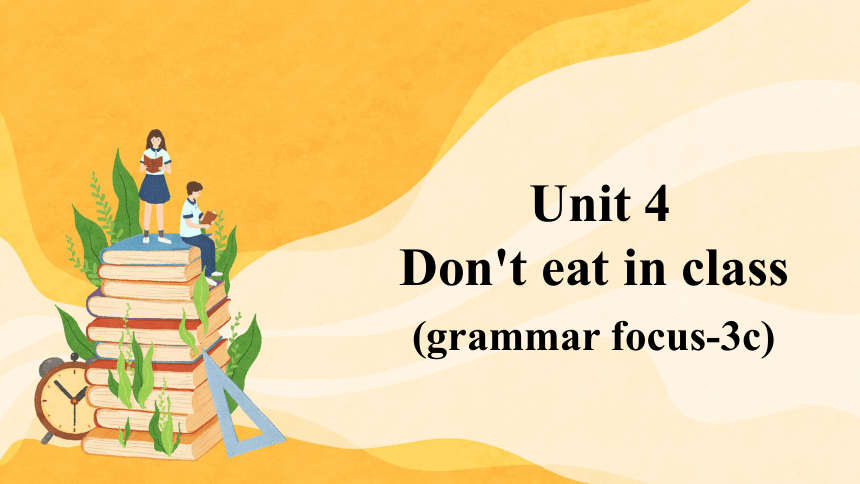 | |
| 格式 | zip | ||
| 文件大小 | 15.4MB | ||
| 资源类型 | 试卷 | ||
| 版本资源 | 人教新目标(Go for it)版 | ||
| 科目 | 英语 | ||
| 更新时间 | 2023-03-11 21:30:47 | ||
图片预览

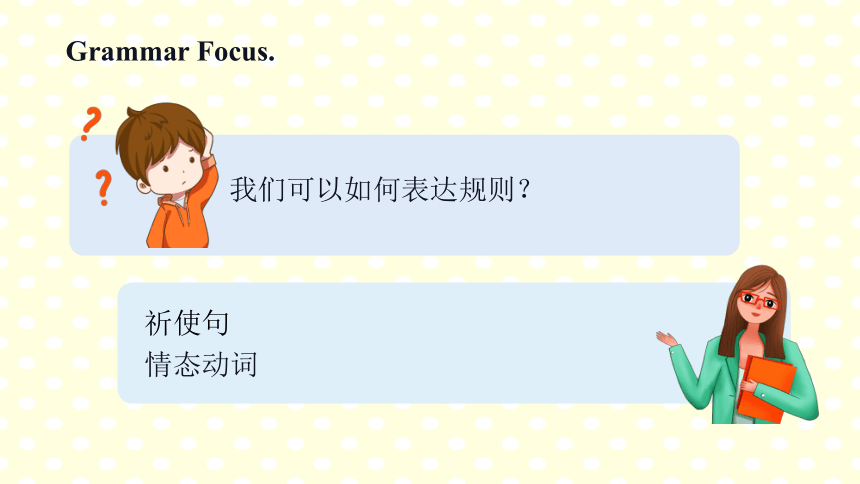

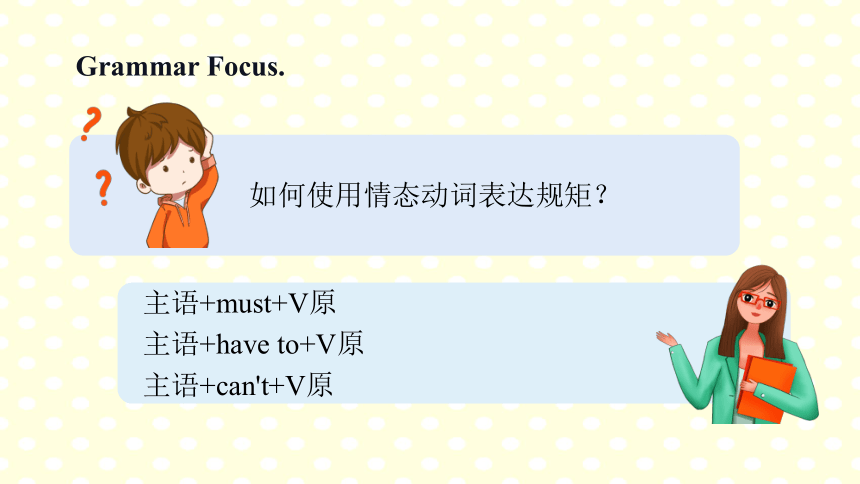

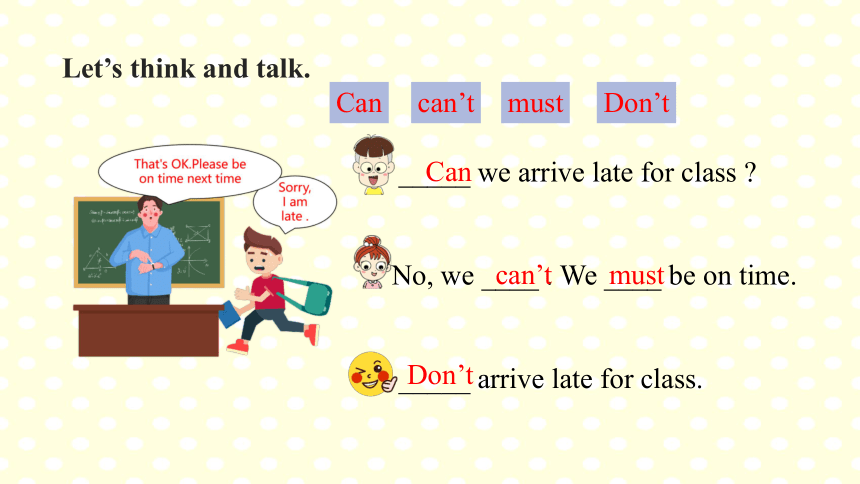


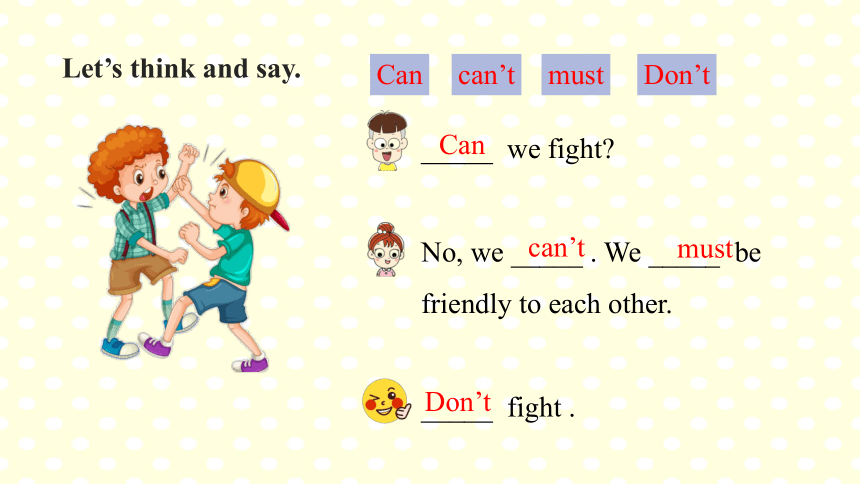
文档简介
(共27张PPT)
Unit 4
Don't eat in class
(grammar focus-3c)
Grammar Focus.
我们可以如何表达规则?
祈使句
情态动词
Grammar Focus.
祈使句如何表达规矩?
Don't +V原....
Grammar Focus.
如何使用情态动词表达规矩?
主语+must+V原
主语+have to+V原
主语+can't+V原
Grammar Focus.
have to在句法上与其他情态动词有何区别?
have to有人称和数的变化。
have to/ has to
Let’s think and talk.
_____ we arrive late for class
No, we ____ . We ____ be on time.
_____ arrive late for class.
Can
Don’t
can’t
must
Can
Don’t
can’t
must
Let’s think and say.
_____ we run in the hallways
No, we _____ . We _____ walk .
_____ run in the hallways.
Can
Don’t
can’t
must
Can
Don’t
can’t
must
Let’s think and say.
_____ we listen to music in class
No, we _____ . We _____ listen to our teacher.
_____ listen to music in class.
Can
Don’t
can’t
must
Can
Don’t
can’t
must
Let’s think and say.
_____ we fight
No, we _____ . We _____ be friendly to each other.
_____ fight .
Can
Don’t
can’t
must
Can
Don’t
can’t
must
Let’s think and say.
_____ we sleep in class
No, we _____ . We _____ listen to the teacher carefully.
_____ sleep in class.
Can
Don’t
can’t
must
Can
Don’t
can’t
must
Let’s think and say.
_____ _____ _____ in class
No, _____ _____ . _____ _____ _____ in the dining hall.
_____ _____ in class.
Can
Don’t
can’t
must
Can
Don’t
you
must
we
eat
can’t
You
eat
eat
1. 不要在楼道里跑。
_______________________
2. 不要打架。
_______________
3. 有什么规则?
__________________________
4. 我们必须按时上课。
__________________________
阅读Grammar Focus,完成下列句子。
Don’t fight.
Don’t run in the hallways.
What are the rules
We must be on time for class.
5. 我们可以在教室里吃东西吗?
_____________________________
6. 不能。但我们可以在餐厅里吃东西。
______________________________
______________________________
7. 我们可以在上课的时候带帽子吗?
___________________________
Can we wear a hat in class
No, we can’t, but we can eat in the dining hall.
Can we eat in the classroom
8. 他在学校里必须穿校服吗?
_________________________________
9. 是的,必须。/ 不,不必。
_______________________________
10. 你们必须做什么?
_______________________________
11. 在图书馆里我们必须保持安静。
________________________________
Yes, he does. / No, he doesn’t.
Does he have to wear a uniform at school
What do you have to do
We have to be quiet in the library.
have to “必须、不得不”
肯定句:我们必须要做作业
We have to do homework.
否定句:...don’t/does't have to...
你可以不用戴帽子。
You don't have to wear a hat.
一般疑问句:do/does+主语+have to...
他必须要要穿校服吗?
Does he have to wear a uniform?
=needn’t...
一、祈使句的肯定式
1. 以行为动词原形开头,Do型。
e.g. Come here. 到这儿来。
2. 以动词be开头,Be型。
e.g. Be quiet, please. 请安静。
3. 以Let开头,Let型。
e.g. Let’s go! 咱们走吧!
二、祈使句的否定式
否定式都可以在句首加don’t。
不要坐在这儿。
Don’t sit here.
别迟到。
Don’t be late.
不要让他走。
Don’t let him go.
注意:
“No+名词/doing形式”表示禁止或规劝,常用于公共场所。
禁止拍照!
No photos!
禁止吸烟!
No smoking!
Let’s practice.
Look at the pictures in 3a and answer the questions.
1
2
3
4
1. What do the pictures tell us
2. Where can you see these signs
3. Can we talk loudly/eat/listen to
music/take photos in the library
Let’s practice.
Write the rules for the school library.
1
2
3
4
Library Rules
1. ____________________________
2. ____________________________
3. ____________________________
4. ____________________________
Don’t talk.
Don’t eat in the library.
Don’t listen to music in the library.
Don’t take photos in the library.
拓展
Write a letter to your parents about the rules at home. Let them know your ideas.
For example:
Be friendly.
Save water.
Don’t go out at night.
Don’t eat in the bed.
Don’t sleep too late.
Don’t waste money.
Don’t talk loudly.
Don’t keep animals.
Don’t talk loudly on the phone.
Don’t watch TV late at night.
Clean the bedroom on Saturdays.
Don’t get up late on Sundays.
Don’t talk loudly at night.
Dear parents,
I know you love me very much. Now I’ve
grown up(长大). We should respect (尊重)each
other. I have some suggestions(建议)for you.
_______________________________________
_______________________________________
_______________________________________
Will you listen to me
2. Eat (he/have to/in the dining hall)
Q: ________________________________
A: _____________
3. Listen to music (we/can/in the hallways)
Q: ________________________________
A: _____________
4. Wear a hat (we/can/in the classroom)
Q: _____________________________
A: ____________
Then answer the questions.
Yes, he does.
Does he have to eat in the dining hall
Can we listen to music in the hallways
No, we can’t.
Can we wear a hat in the classroom
No, we can’t.
I.将下面的句子改为祈使句,每空一词。
1. You can stand up.
______ ____, please.
2. I can help you.
_____ me ______ you.
3. You can’t talk in class.
_______ _____ in class.
4. You can’t be late for class.
______ ____ late for class.
Stand up
Let help
Don’t talk
Don’t be
1. -- Can the students eat in the classroom (作否定回答)
-- No, ___________.
2. Tom has to play basketball every Friday. (改为一般疑问句)
_____Tom _____ ___ play basketball every Friday
they can’t
Does have to
II.按要求完成句子,每空一词。
3. You can’t wear a hat in class. (改为祈使句)
______ ____ a hat in class.
4. He has to see his grandparents on weekends. (对划线部分提问)
What _____ he ____ ____ ____ on weekends
5. Come in, please. (改为否定句)
_____ _____ in, please.
Don’t wear
does
have to do
Don’t come
Unit 4
Don't eat in class
(grammar focus-3c)
Grammar Focus.
我们可以如何表达规则?
祈使句
情态动词
Grammar Focus.
祈使句如何表达规矩?
Don't +V原....
Grammar Focus.
如何使用情态动词表达规矩?
主语+must+V原
主语+have to+V原
主语+can't+V原
Grammar Focus.
have to在句法上与其他情态动词有何区别?
have to有人称和数的变化。
have to/ has to
Let’s think and talk.
_____ we arrive late for class
No, we ____ . We ____ be on time.
_____ arrive late for class.
Can
Don’t
can’t
must
Can
Don’t
can’t
must
Let’s think and say.
_____ we run in the hallways
No, we _____ . We _____ walk .
_____ run in the hallways.
Can
Don’t
can’t
must
Can
Don’t
can’t
must
Let’s think and say.
_____ we listen to music in class
No, we _____ . We _____ listen to our teacher.
_____ listen to music in class.
Can
Don’t
can’t
must
Can
Don’t
can’t
must
Let’s think and say.
_____ we fight
No, we _____ . We _____ be friendly to each other.
_____ fight .
Can
Don’t
can’t
must
Can
Don’t
can’t
must
Let’s think and say.
_____ we sleep in class
No, we _____ . We _____ listen to the teacher carefully.
_____ sleep in class.
Can
Don’t
can’t
must
Can
Don’t
can’t
must
Let’s think and say.
_____ _____ _____ in class
No, _____ _____ . _____ _____ _____ in the dining hall.
_____ _____ in class.
Can
Don’t
can’t
must
Can
Don’t
you
must
we
eat
can’t
You
eat
eat
1. 不要在楼道里跑。
_______________________
2. 不要打架。
_______________
3. 有什么规则?
__________________________
4. 我们必须按时上课。
__________________________
阅读Grammar Focus,完成下列句子。
Don’t fight.
Don’t run in the hallways.
What are the rules
We must be on time for class.
5. 我们可以在教室里吃东西吗?
_____________________________
6. 不能。但我们可以在餐厅里吃东西。
______________________________
______________________________
7. 我们可以在上课的时候带帽子吗?
___________________________
Can we wear a hat in class
No, we can’t, but we can eat in the dining hall.
Can we eat in the classroom
8. 他在学校里必须穿校服吗?
_________________________________
9. 是的,必须。/ 不,不必。
_______________________________
10. 你们必须做什么?
_______________________________
11. 在图书馆里我们必须保持安静。
________________________________
Yes, he does. / No, he doesn’t.
Does he have to wear a uniform at school
What do you have to do
We have to be quiet in the library.
have to “必须、不得不”
肯定句:我们必须要做作业
We have to do homework.
否定句:...don’t/does't have to...
你可以不用戴帽子。
You don't have to wear a hat.
一般疑问句:do/does+主语+have to...
他必须要要穿校服吗?
Does he have to wear a uniform?
=needn’t...
一、祈使句的肯定式
1. 以行为动词原形开头,Do型。
e.g. Come here. 到这儿来。
2. 以动词be开头,Be型。
e.g. Be quiet, please. 请安静。
3. 以Let开头,Let型。
e.g. Let’s go! 咱们走吧!
二、祈使句的否定式
否定式都可以在句首加don’t。
不要坐在这儿。
Don’t sit here.
别迟到。
Don’t be late.
不要让他走。
Don’t let him go.
注意:
“No+名词/doing形式”表示禁止或规劝,常用于公共场所。
禁止拍照!
No photos!
禁止吸烟!
No smoking!
Let’s practice.
Look at the pictures in 3a and answer the questions.
1
2
3
4
1. What do the pictures tell us
2. Where can you see these signs
3. Can we talk loudly/eat/listen to
music/take photos in the library
Let’s practice.
Write the rules for the school library.
1
2
3
4
Library Rules
1. ____________________________
2. ____________________________
3. ____________________________
4. ____________________________
Don’t talk.
Don’t eat in the library.
Don’t listen to music in the library.
Don’t take photos in the library.
拓展
Write a letter to your parents about the rules at home. Let them know your ideas.
For example:
Be friendly.
Save water.
Don’t go out at night.
Don’t eat in the bed.
Don’t sleep too late.
Don’t waste money.
Don’t talk loudly.
Don’t keep animals.
Don’t talk loudly on the phone.
Don’t watch TV late at night.
Clean the bedroom on Saturdays.
Don’t get up late on Sundays.
Don’t talk loudly at night.
Dear parents,
I know you love me very much. Now I’ve
grown up(长大). We should respect (尊重)each
other. I have some suggestions(建议)for you.
_______________________________________
_______________________________________
_______________________________________
Will you listen to me
2. Eat (he/have to/in the dining hall)
Q: ________________________________
A: _____________
3. Listen to music (we/can/in the hallways)
Q: ________________________________
A: _____________
4. Wear a hat (we/can/in the classroom)
Q: _____________________________
A: ____________
Then answer the questions.
Yes, he does.
Does he have to eat in the dining hall
Can we listen to music in the hallways
No, we can’t.
Can we wear a hat in the classroom
No, we can’t.
I.将下面的句子改为祈使句,每空一词。
1. You can stand up.
______ ____, please.
2. I can help you.
_____ me ______ you.
3. You can’t talk in class.
_______ _____ in class.
4. You can’t be late for class.
______ ____ late for class.
Stand up
Let help
Don’t talk
Don’t be
1. -- Can the students eat in the classroom (作否定回答)
-- No, ___________.
2. Tom has to play basketball every Friday. (改为一般疑问句)
_____Tom _____ ___ play basketball every Friday
they can’t
Does have to
II.按要求完成句子,每空一词。
3. You can’t wear a hat in class. (改为祈使句)
______ ____ a hat in class.
4. He has to see his grandparents on weekends. (对划线部分提问)
What _____ he ____ ____ ____ on weekends
5. Come in, please. (改为否定句)
_____ _____ in, please.
Don’t wear
does
have to do
Don’t come
同课章节目录
- Unit 1 Can you play the guitar?
- Section A
- Section B
- Unit 2 What time do you go to school?
- Section A
- Section B
- Unit 3 How do you get to school?
- Section A
- Section B
- Unit 4 Don't eat in class.
- Section A
- Section B
- Unit 5 Why do you like pandas?
- Section A
- Section B
- Unit 6 I'm watching TV.
- Section A
- Section B
- Review of Units 1-6
- Unit 7 It's raining!
- Section A
- Section B
- Unit 8 Is there a post office near here?
- Section A
- Section B
- Unit 9 What does he look like?
- Section A
- Section B
- Unit 10 I'd like some noodles.
- Section A
- Section B
- Unit 11 How was your school trip?
- Section A
- Section B
- Unit 12 What did you do last weekend?
- Section A
- Section B
